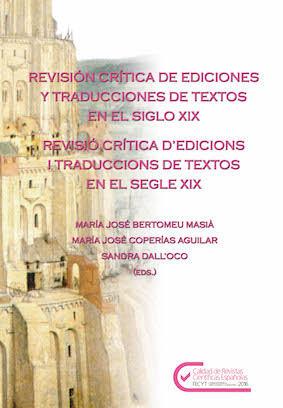Cartes de Margarida de Parma (1578-1581) en l'edició de Charles Piot
DOI:
https://doi.org/10.7203/qdfed.22.11193Paraules clau:
Margarida de Parma, Granvela, Països Baixos, correspondència, segle XVI Resum
Resum
Estudio sobre la edición llevada a cabo a mediados del siglo xix sobre la correspondencia de Margarita de Parma. La collatio de los documentos impresos con los originales de la correspondencia entre Margarita de Parma, hija natural de Carlos V, y el cardenal Granvela, secretario en este momento (1578-1581) del rey Felipe II, con los volúmenes editados por Charles Piot y conservados en la Bibliothèque Municipale de Besançon, y en el Archivio di Stato di Napoli, arrojan luz sobre la metodología usada en la edición de las cartas y hace necesaria una revisión del epistolario.
 Descàrregues
Descàrregues
Descàrregues
Publicades
Com citar
-
Resum1016
-
PDF (Español)548
-
PDF642
-
PDF 132
Número
Secció
Llicència
 Este obra está bajo una licencia de Creative Commons Reconocimiento-NoComercial-SinObraDerivada 4.0 Internacional.
Este obra está bajo una licencia de Creative Commons Reconocimiento-NoComercial-SinObraDerivada 4.0 Internacional.
Tots els documents inclosos a OJS són d'accés lliure i propietat dels seus autors i/o institucions editores, i per tant, qualsevol acte de reproducció, comercialització, comunicació pública o transformació total o parcial necessita el consentiment exprés i escrit d'aquests.
________
Authors who publish with this journal agree to the following terms:
- Authors retain copyright and grant the journal right of first publication with the work simultaneously licensed under a Creative Commons Attribution License that allows others to share the work with an acknowledgement of the work's authorship and initial publication in this journal.
- Authors are able to enter into separate, additional contractual arrangements for the non-exclusive distribution of the journal's published version of the work (e.g., post it to an institutional repository or publish it in a book), with an acknowledgement of its initial publication in this journal.
- Authors are permitted and encouraged to post their work online (e.g., in institutional repositories or on their website) prior to and during the submission process, as it can lead to productive exchanges, as well as earlier and greater citation of published work (See The Effect of Open Access).




